Ah, Bangladesh! My beloved nation—perpetually at a "critical crossroads," much like a master's student who's read too much Gramsci to remain confused. "The old world is dying, and the new world struggles to be born; now is the time of monsters," wrote Italian Marxist philosopher Antonio Gramsci. Clearly, the man had a front-row ticket to Dhaka's political circus.
If ever there were a residency programme for Gramsci's monsters, it's here—as Bangladesh stumbles from kleptocracy towards something vaguely resembling democracy. The real challenge isn't spotting the monsters; it's finding anyone with enough brain cells to slay them.
The country's interim government shoulders a responsibility so heavy it's practically collapsing under it. To its absolute credit, it prevented an economic meltdown, allowed the financial sector to thrive, and kept social chaos from boiling over. But its weaknesses are dazzling. Governance gaps, unmet reform promises, and a noticeable disconnect from public sentiment have produced a splendid cocktail of confusion.
The erosion of secular political plurality, the gradual rise of far-right populism among our power falcons, and that sporadic mosaic of violence continue to blur the line between who wags whom—the dog or the tail. The interim's definition of "public" feels alarmingly familiar: much like the Awami League's version, where "public" meant "our voters," and the rest were decorative extras.
Yet, after the signing of the July National Charter, Bangladesh has apparently once again become a "new Bangladesh"—a convenient avowal that has become a cliché!
Meanwhile, the Election Commission's roadmap remains elusive. Even Jamaat-e-Islami has expressed exasperation and humming about proportional representation, while the BNP—ever-evolving—now talks of restoring the credibility of the electoral process. All parties agree on one point: reform within the interim cabinet, reflecting a growing lack of confidence in some advisers! Irony!
At the same time, social media gladiators, armed with echo chambers and homophily, are busy dismantling institutions in real time. It's democracy by dopamine.
As if that weren't enough, our interim administration has developed an odd affection for "outsider advisers"—plucked from cozy networks rather than shared national purpose. Nepotism thrives, "foreign credentialed saviours" swoop in, and some even question the qualifications of several imported experts. It leaves one wondering how they would ensure they pick the right public officials, beyond political prejudices, to run an election? And then, the National Citizen Party (NCP) voiced that some advisers were already seeking "safe exits." The optics, to put it mildly, are not inspiring confidence.
The reform commissions fare no better—ticking boxes with the enthusiasm of retired bureaucrats and NGO-intellectuals in a fire drill. Professor Rehman Sobhan once quipped that proposing 84 reforms ensures "no one will take you seriously." The result is a theatre of "tick-mark national consensus."
Civil society, meanwhile, has outdone itself in disappointment. Its moral authority now hovers somewhere between a late-night talk show and frustration vented through conferences and meetings.
Unsurprisingly, this blend of chaos and confusion is brewing instability. Anxiety, fear of extremism, and the social post-traumatic stress disorder (PTSD) of July's mass murders still haunt the streets. Add to that the coercive charm of mobs, "bulldozer justice," and weakened law enforcement, and you have a society oscillating between trauma and hysteria.
BNP leader Salahuddin Ahmed recently hinted at a widening distance between the military and Dr Yunus—a political barometer worth noting too. The armed forces, once the silent arbiter in moments of crisis, now appear cautious, wary of being drawn into partisan theatre. That distance, good or bad, also deepens the vacuum of authority that the interim seems unable to fill.
Yet, the government's greatest peril lies elsewhere: the disturbing discourse on the politicisation of the International Crimes Tribunal. Seasoned observers like David Bergman have warned that weaponising war crimes justice for political leverage would destroy the very legitimacy it seeks to preserve.
Bangladesh cannot afford another chapter of selective justice masquerading as national healing. If the tribunal becomes a political instrument rather than a moral reckoning, the "time of monsters" will stretch indefinitely. Time will tell.
Which brings us, inevitably, to the question everyone's talking about: elections. Delays wrapped in reform rhetoric, "inclusive–exclusive" gymnastics, or constitutional hair-splitting are nothing but transparent excuses. Good thing that a large section of the public is punching these narratives out. The nation awaits a credible election by February 2026.
And if this interim experiment is to drift—plagued by obscurity, elitism, or disconnect—what would be the solution then? BNP recently has asked the interim to play a neutral role like that of a caretaker government at a recent meeting, according to one of the advisers. It is worth noting that narratives of corruption allegations have already returned to the blackboards—this time, the writing is not just about the political parties!
Joseph de Maistre reminded us that every nation gets the government it deserves. Ours might still deserve a fighting chance, unless this current situation continues and the interim, its beloved so-called civil society, and the parties all fail to complete the task at hand.
We can only hope that their collective restraint and sense of national duty may yet determine whether Bangladesh steps towards stability—or sinks into another act of tragic farce. And if they fail, dear reader, the monsters won't just linger—they'll throw a costume party. And the shimmering promise of a democratic Bangladesh, envisioned by the fallen souls of July 2024, will remain just that: a dream deferred.
Until then, let's monitor a credible election—perhaps under the watchful eye of the public—and enjoy the show while the popcorn still lasts.
Shahab Enam Khan is head of Bangladesh Center for Indo-Pacific Affairs at Jahangirnagar University and teaches at the Bangladesh University of Professionals.
FP/MI
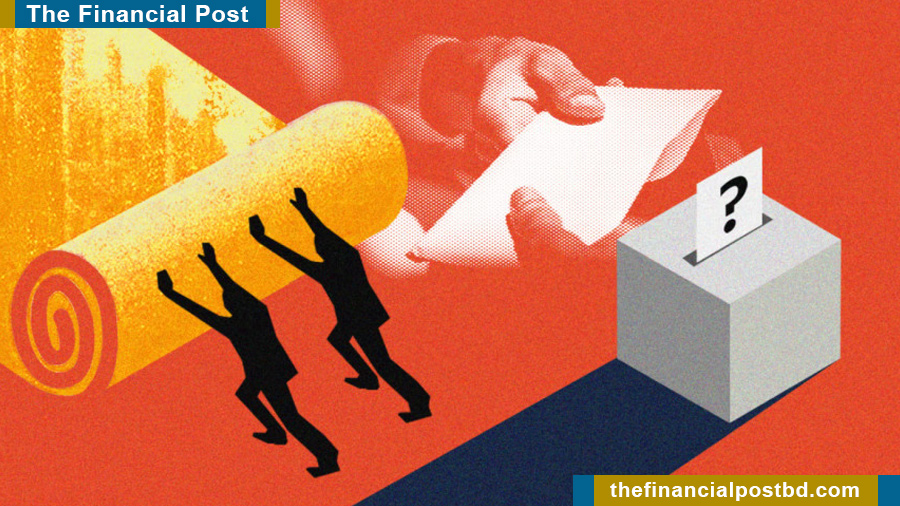

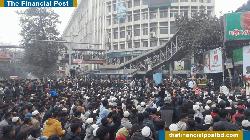 Shahbagh blocked as Inqilab Moncho demands justice for Hadi
Shahbagh blocked as Inqilab Moncho demands justice for Hadi
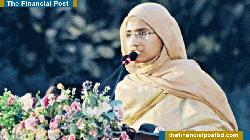 NCP to pay ‘heavy price’ if it aligns with Jamaat: Samantha Sharmin
NCP to pay ‘heavy price’ if it aligns with Jamaat: Samantha Sharmin
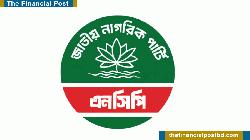 170 NCP leaders back possible alliance with Jamaat
170 NCP leaders back possible alliance with Jamaat
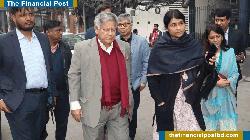 Govt firm on punishing those involved in attacks on media: Shipping Adviser
Govt firm on punishing those involved in attacks on media: Shipping Adviser
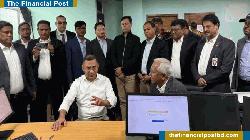 EC approves inclusion of Tarique Rahman in voter list
EC approves inclusion of Tarique Rahman in voter list